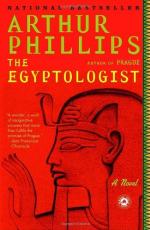|
This section contains 651 words (approx. 2 pages at 400 words per page) |

|
The Egyptologist Summary & Study Guide Description
The Egyptologist Summary & Study Guide includes comprehensive information and analysis to help you understand the book. This study guide contains the following sections:
This detailed literature summary also contains Topics for Discussion and a Free Quiz on The Egyptologist by Arthur Phillips.
Ralph Trilipush seeks the tomb of Atum-hadu, an ancient Egyptian king who supposedly wrote a book of erotic poetry. Ralph translates the poetry and publishes the work, which quickly becomes notorious as pornography in the early 20th century. However, with only this questionable evidence of the king's existence, Ralph secures the financial backing of a group of Boston businessmen, one of whom desperately needs the treasure that Ralph promises to find.
While Ralph travels to Egypt and begins his expedition, trouble brews back in Boston. Harold Ferrell, a detective from Sydney, Australia hunts for information about Paul Caldwell, an illegitimate child of Barnabas Davies. Davies wants all his illegitimate children to change their names to his, and he pays well to encourage them to do so. Ferrell has learned much about Paul—how he became interested in Egyptology, served in Egypt during the First World War, and that he allegedly died in the desert along with a British army officer, Hugo Marlowe. The search for information leads to Ralph because he had been stationed with Marlowe.
Ralph is engaged to Margaret Finneran, the daughter of Chester Crawford Finneran (CCF), one of Ralph's investors. A romantic interest develops in Ferrell for Margaret, and this causes him to talk badly of Ralph's true motivations. CCF withholds the money that Ralph desperately needs. Margaret calls off the engagement.
Ralph discovers something at about the same time that Howard Carter unearths King Tut's tomb. To Ralph's dismay and at the cost of his sanity, he opens empty room after empty room. Ralph loses his mind and tries to create a tomb where none exists. CCF goes to Egypt expecting to find treasure, but all he encounters is death by a madman wielding a sledgehammer inside a ghastly set of rooms.
Some evidence points to Ralph as not being who he claims to be. The Ralph Trilipush who goes to war with Marlowe is homosexual. The Ralph Trilipush who proposes to Margaret does not seem to have this sexual orientation, or if he does, he takes no action and expresses no fantasy. Ferrell is convinced that Ralph killed both Marlowe and Paul, but his investigation techniques lack discipline and are therefore untrustworthy. Ralph gives Ferrell several possibilities of what might have happened to Marlowe and Paul. In one, Paul sees a reflection on a motorcycle gas tank of Marlowe drawing his pistol, and Paul shoots first. This could be the real story, where Paul learns from Marlowe certain behaviors of Ralph and takes on the identity after killing Marlowe.
The author tells the story through letters, journal entries, telegrams and notes. The missives have dates but no grouping into chapters or sections, as if the reader holds a bundle of papers without explanation. No objective story emerges, only the viewpoints of people with different agendas. Ralph wants to become a famous Egyptologist. CCF wants to get out of his financial crisis through the treasure that Ralph is supposed to find in Egypt. Ferrell wants to solve murder cases and does not care if he accuses an innocent person. Exactly what Margaret wants boils down to something she does not want—boredom. She becomes addicted to opium and alcohol as a means to have fun.
The story is both a mystery and a tragedy. Ralph murders CCF and kills himself, which are tragic events. Ralph's decent into insanity is a tragic process. Ralph's true identity is a mystery, along with the existence of Atum-hadu's tomb. The author uses irony and plot twists, along with droll humor, in fashioning this tale of someone who is a failed Egyptologist, but perhaps a successful seeker of immortality. Ralph creates his own tomb at the end, the work of a madman, but a work that may last for millennia. People will remember his name; not as a great man, but as an enigmatic crazy person.
Read more from the Study Guide
|
This section contains 651 words (approx. 2 pages at 400 words per page) |

|



